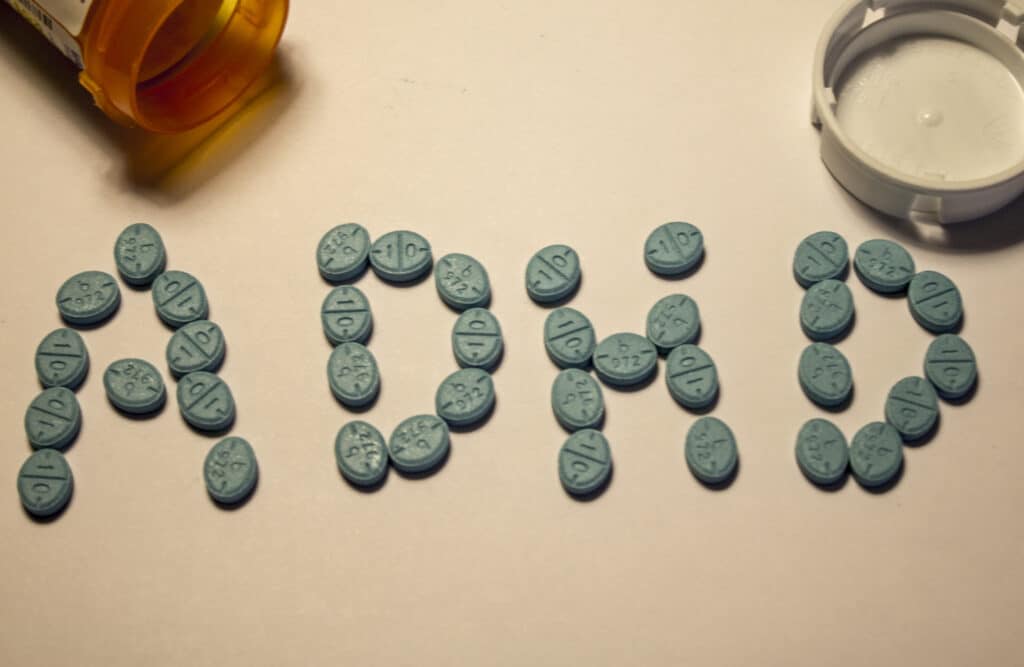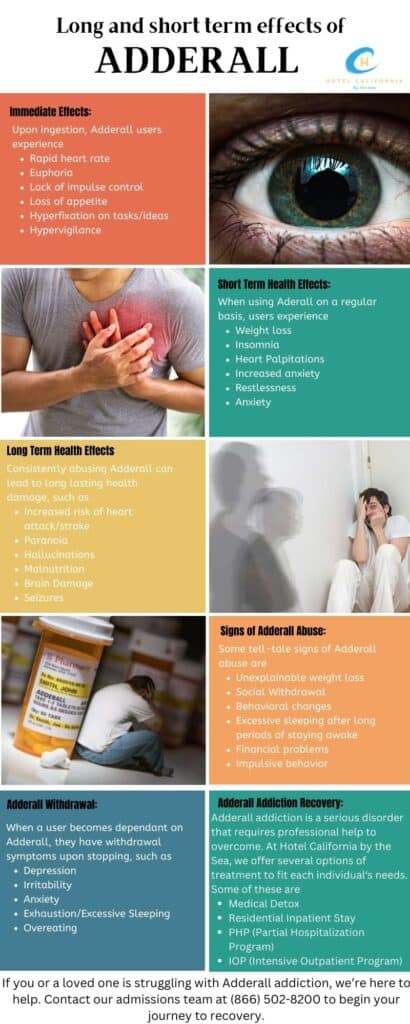Dangerous Long-term Effects of Adderall
Adderall, a prescription stimulant, is one of the most popularly prescribed medications in the United States. It is also one of the most commonly abused prescription medications. In 2012, doctors wrote an estimated 16 million prescriptions for stimulants like Adderall. Many people are unaware of the long term effects of Adderall, assuming that prescribed use over time carries minimal risk.
Adderall is the brand name medication for a combination of the active ingredients dextroamphetamine and amphetamine. Adderall is used for short-term treatment and management of attention deficit hyperactivity disorder (ADHD). Adderall is safe when taken as prescribed and as intended. However, when taken outside medical guidelines, the drug can become addictive and dangerous.
Medically prescribed adderall can help users improve their focus, decrease impulsivity, and improve mood, productivity and attention span. It helps to bring the brain down from a state of intense overstimulation to a state of normal baseline stimulation. Adderall also affects the part of the brain that controls hyperactivity and impulses while improving focus and decision-making.
Research has found that Adderall doesn’t have much of a positive effect on those who do not have conditions such as ADHD. In fact, it can lead to the opposite desired effects.

Who is most likely to misuse Adderall?
The FDA-approved medication is a Schedule II controlled substance. It can only be legally obtained through a medical prescription for treating ADHD. Adderall is a powerful stimulant often misused for weight loss, studying, sports, and staying awake. The long term effects of Adderall can include cardiovascular problems, anxiety, and dependence, which are often overlooked by users seeking immediate focus and energy.
Students and young adult professionals commonly misuse it. The drug helps them stay awake and focused for longer to help meet the demands of school or their professional careers. In fact, research has found that college students are twice as likely to abuse Adderall than their peers who are not in college.
Athletes are also more prone to abusing Adderall to help counter fatigue and enhance their physical performance. This can be especially useful during practices and competitions. Another group who is likely to abuse the drug are those who suffer from eating disorders. Individuals may abuse Adderall to suppress appetite and pursue alternative weight loss options.
In 2012, more than 116,000 individuals sought rehabilitation for addiction to amphetamines, including Adderall. Adderall dependency occurs naturally because of how the drug affects brain and body chemicals. It can produce feelings of confidence, euphoria and increased concentration and mental focus. An Adderall addiction is characterized by a person’s physical and psychological dependence on the drug.
Adderall usually comes in two forms: an oral tablet and an extended-release oral capsule. Adderall can also referred to as speed, uppers, euphoria, and addys.
Signs of potential Adderall abuse:
- Being overly talkative
- Unusual loss of appetite and excessive weight loss
- Social withdrawal from peers, friends, families and co-workers
- Sleeping for long periods of time
- Secretive behavior
- Impaired memory and memory loss
- Decline in relationships with others
- Decline in personal hygiene
- Frequently taking pills
- Development of financial difficulties due to drug use
- Overworking or over-concentrating
- Confusion
- Mania
- Impulsive behaviors
Doctors prescribe Adderall for short-term use, and long-term adderall use can lead to adverse effects. The most concerning potential long term effects of adderall include the development of dependence and addiction. Prescription stimulants such as Adderall alter the naturally occurring chemicals in the brain. They enhance the effects of various neurotransmitters such as dopamine and norepinephrine.
Norepinephrine affects how the brain responds to events, focuses, pays attention, and reacts to stimuli. Dopamine is the “feel good” chemical that acts on the reward system of the brain. Adderall is able to produce unnaturally high levels of these brain chemicals. This leads the user to develop a tolerance and dependence on the substance.

Long-term Effects of Adderall
The long-term effects of Adderall are a significant concern. The stimulant amphetamine has a high potential for abuse. It can also lead to damaging effects on the brain and body.
One major symptom includes its effects on personality. Taking too high of a dose, or too frequently can cause a “zombie-like” effect. This occurs when a person begins to feel numb and loses the ability to express a normal range of emotions.
Another one of the dangerous long term effects of Adderall includes the changes in how your brain produces and processes neurotransmitters. These physical changes can lead to brain neurotoxicity, causing behavioral changes and mental health issues like anxiety and depression. Symptoms of neurotoxicity include psychosis, paranoid delusions, and intense hallucinations.
Other long term effects of adderall include:
- Weight loss and decreased appetite
- Stomach issues
- Head pain and nausea
- Decreased energy or intense fatigue
- Development or worsening of anxiety, depression and suicidal ideation
- Panic
- Low or irritable mood
- Heart conditions – increased risk for heart attack and stroke, increased blood pressure and heart rate
- Uncontrollable tics and seizures
- Hallucinations
- Paranoia
- Blurred vision
- Brain damage
- Kidney damage
- Stunted growth and development in younger users
Short-term side effects of Adderall include:
- Feelings of more energy and focus
- Motivation and productivity
- Impulse control
- Restlessness
- Digestive problems
- Sleep issues
- Shortness of breath
- Increased heart rate
- Weight loss and loss of appetite
- Nervousness
- Dizziness
- Dry mouth
Check Your Insurance Coverage for FREE
Find out if your insurance covers addiction treatment in minutes. We accept most insurance!
Adderall Withdrawal Timeline
In 2022, the U.S. saw a shortage in the manufacturing of Adderall. Manufacturers and pharmacies were unable to refill needed prescriptions for patients in need of treatment for their ADHD. A number of factors cause the shortage. The shortage resulted in some experiencing varying levels of Adderall withdrawal symptoms.
Prescription stimulant drugs have a high potential for abuse that often leads to withdrawal. Users can experience withdrawal symptoms after high doses of the substance have dramatically decreased or stopped completely. During Adderall withdrawal, the brain begins to produce stress hormones that can lead to a heightened stress response in the body.
Typical withdrawal symptoms include body aches, insomnia, worsening anxiety and depression, intense cravings, panic attacks, mood swings, extreme fatigue and suicidal thoughts and behaviors. Users can also experience a return of symptoms that Adderall was treating. These include the inability to focus, decreased energy, problems with concentration and short-term memory loss.
- In the first 6-36 hours of withdrawal, users begin to feel intense depression and fatigue.
- Days 3-5 of withdrawal include intense feelings of irritability along with feelings of anxiety and depression. Some users also experience headaches and nightmares. This period is usually the height of the withdrawal intensity.
- During days 5-7 withdrawal symptoms will begin to fade, but can still continue to linger.
- During weeks 3-4, users may develop symptoms of rebound effects that can continue for weeks after. Rebound symptoms are the return of symptoms linked to the condition that becomes more severe compared to its initial prompt before drug use. This can be especially true for those who have a higher tolerance for the drug, and is one of many long term effects of Adderall.
Individuals can cope with and manage withdrawal symptoms using several different methods.
- Take a few days off from work, school, or any obligations. Utilize this time to physically and mentally rest.
- Stay hydrated and stock up on healthy food and snacks. Good nutrition will help nourish and heal the brain from the damage created by the drugs.
- Remove the substance from your home to avoid temptation to use.
- Request that friends and family regularly check in on you. Having a good support system can keep you accountable in your recovery.
- Seek out a therapist or counselor to consult with. Evidence-based therapy has proven highly effective in helping people overcome their addiction to stimulant amphetamines.
- Identify a hobby or activity to engage in when you experience the urge. Finding other productive and healthier ways to occupy your time can help in your recovery from your addiction.
Reach out to Hotel California by the Sea
We specialize in treating addiction and other co-occurring disorders, such as PTSD. Our Admissions specialists are available to walk you through the best options for treating your addiction.
Hotel California by the Sea provides substance use disorder treatment for those experiencing an addiction to prescription amphetamine medications such as Adderall. The wide range of treatment care includes detox, residential, PHP and IOP programs. Our behavioral health recovery program specializes in treating co-occurring mental health conditions that many patients have when they are trying to overcome an addiction.
Treatment programs such as CBT, EMDR therapy and group therapy help clients find ways to cope. They learn to manage difficult feelings linked to their addiction. Hotel California by the Sea believes each client has his or her own obstacles and challenges to overcome. By creating an individualized treatment plan, clients are more likely to find success in their recovery at one of many locations around the nation.
References:
https://www.healthline.com/health/adderall-effects-on-brain
https://www.healthline.com/health/adhd/adderall-effects-on-body
https://www.addictioncenter.com/stimulants/adderall/withdrawal-detox/
https://www.hazeldenbettyford.org/addiction/adderall-symptoms
https://www.verywellmind.com/adderall-withdrawal-symptoms-timeline-and-treatment-4177486
